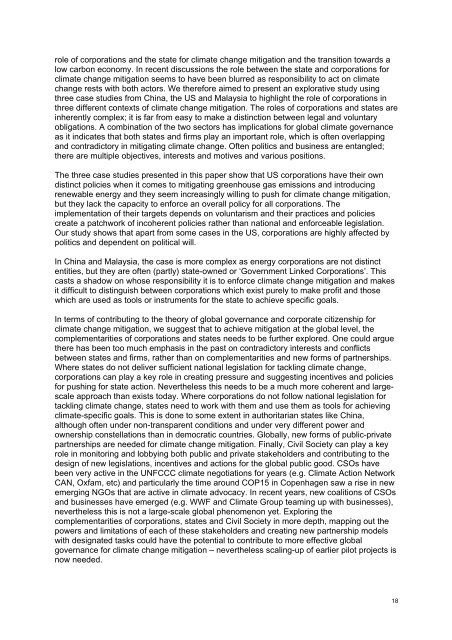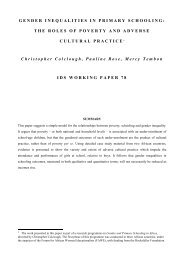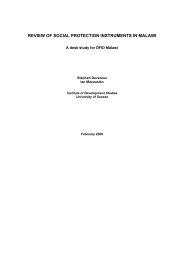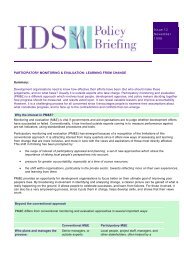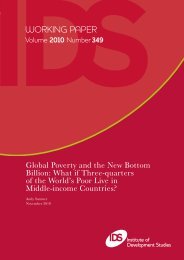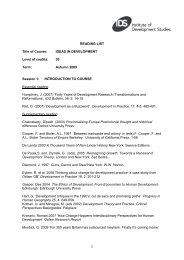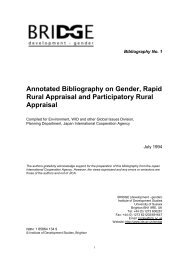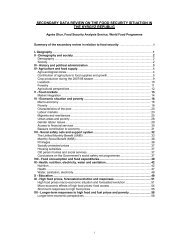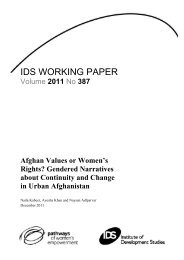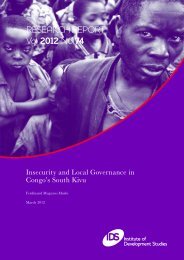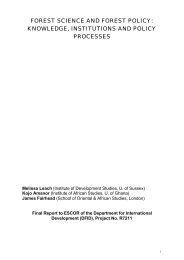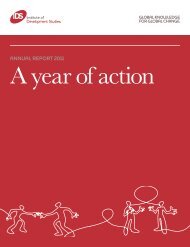IDS WORKING PAPER - Institute of Development Studies
IDS WORKING PAPER - Institute of Development Studies
IDS WORKING PAPER - Institute of Development Studies
You also want an ePaper? Increase the reach of your titles
YUMPU automatically turns print PDFs into web optimized ePapers that Google loves.
ole <strong>of</strong> corporations and the state for climate change mitigation and the transition towards a<br />
low carbon economy. In recent discussions the role between the state and corporations for<br />
climate change mitigation seems to have been blurred as responsibility to act on climate<br />
change rests with both actors. We therefore aimed to present an explorative study using<br />
three case studies from China, the US and Malaysia to highlight the role <strong>of</strong> corporations in<br />
three different contexts <strong>of</strong> climate change mitigation. The roles <strong>of</strong> corporations and states are<br />
inherently complex; it is far from easy to make a distinction between legal and voluntary<br />
obligations. A combination <strong>of</strong> the two sectors has implications for global climate governance<br />
as it indicates that both states and firms play an important role, which is <strong>of</strong>ten overlapping<br />
and contradictory in mitigating climate change. Often politics and business are entangled;<br />
there are multiple objectives, interests and motives and various positions.<br />
The three case studies presented in this paper show that US corporations have their own<br />
distinct policies when it comes to mitigating greenhouse gas emissions and introducing<br />
renewable energy and they seem increasingly willing to push for climate change mitigation,<br />
but they lack the capacity to enforce an overall policy for all corporations. The<br />
implementation <strong>of</strong> their targets depends on voluntarism and their practices and policies<br />
create a patchwork <strong>of</strong> incoherent policies rather than national and enforceable legislation.<br />
Our study shows that apart from some cases in the US, corporations are highly affected by<br />
politics and dependent on political will.<br />
In China and Malaysia, the case is more complex as energy corporations are not distinct<br />
entities, but they are <strong>of</strong>ten (partly) state-owned or ‘Government Linked Corporations’. This<br />
casts a shadow on whose responsibility it is to enforce climate change mitigation and makes<br />
it difficult to distinguish between corporations which exist purely to make pr<strong>of</strong>it and those<br />
which are used as tools or instruments for the state to achieve specific goals.<br />
In terms <strong>of</strong> contributing to the theory <strong>of</strong> global governance and corporate citizenship for<br />
climate change mitigation, we suggest that to achieve mitigation at the global level, the<br />
complementarities <strong>of</strong> corporations and states needs to be further explored. One could argue<br />
there has been too much emphasis in the past on contradictory interests and conflicts<br />
between states and firms, rather than on complementarities and new forms <strong>of</strong> partnerships.<br />
Where states do not deliver sufficient national legislation for tackling climate change,<br />
corporations can play a key role in creating pressure and suggesting incentives and policies<br />
for pushing for state action. Nevertheless this needs to be a much more coherent and largescale<br />
approach than exists today. Where corporations do not follow national legislation for<br />
tackling climate change, states need to work with them and use them as tools for achieving<br />
climate-specific goals. This is done to some extent in authoritarian states like China,<br />
although <strong>of</strong>ten under non-transparent conditions and under very different power and<br />
ownership constellations than in democratic countries. Globally, new forms <strong>of</strong> public-private<br />
partnerships are needed for climate change mitigation. Finally, Civil Society can play a key<br />
role in monitoring and lobbying both public and private stakeholders and contributing to the<br />
design <strong>of</strong> new legislations, incentives and actions for the global public good. CSOs have<br />
been very active in the UNFCCC climate negotiations for years (e.g. Climate Action Network<br />
CAN, Oxfam, etc) and particularly the time around COP15 in Copenhagen saw a rise in new<br />
emerging NGOs that are active in climate advocacy. In recent years, new coalitions <strong>of</strong> CSOs<br />
and businesses have emerged (e.g. WWF and Climate Group teaming up with businesses),<br />
nevertheless this is not a large-scale global phenomenon yet. Exploring the<br />
complementarities <strong>of</strong> corporations, states and Civil Society in more depth, mapping out the<br />
powers and limitations <strong>of</strong> each <strong>of</strong> these stakeholders and creating new partnership models<br />
with designated tasks could have the potential to contribute to more effective global<br />
governance for climate change mitigation – nevertheless scaling-up <strong>of</strong> earlier pilot projects is<br />
now needed.<br />
18


